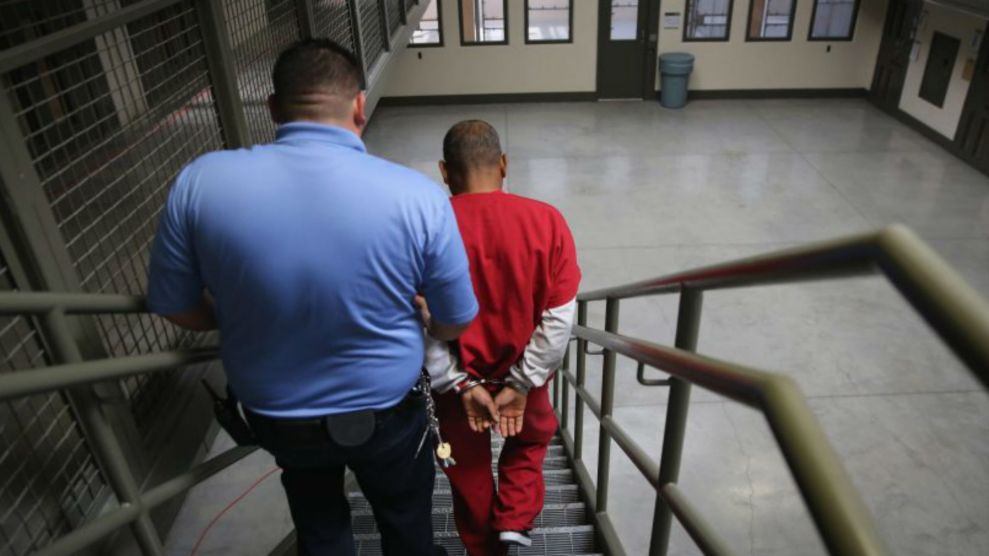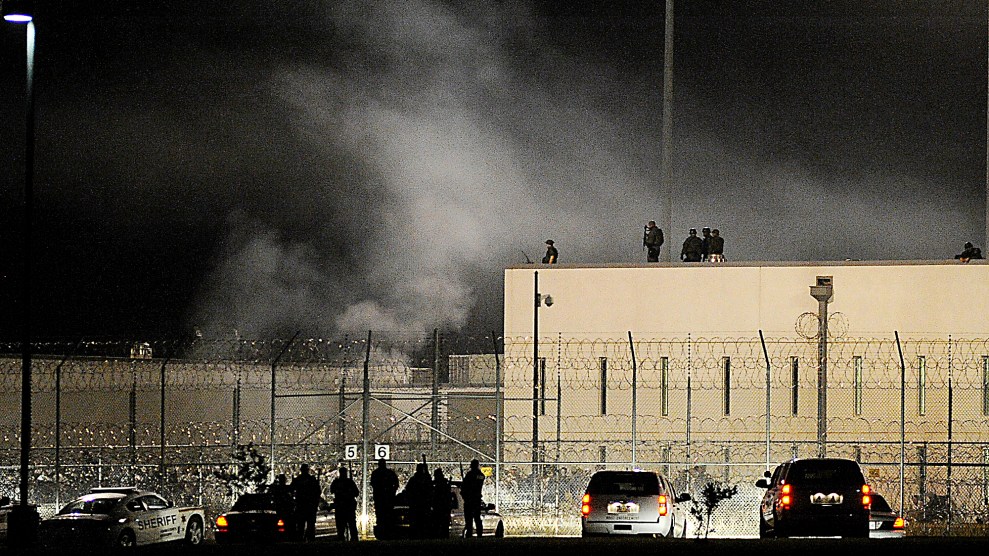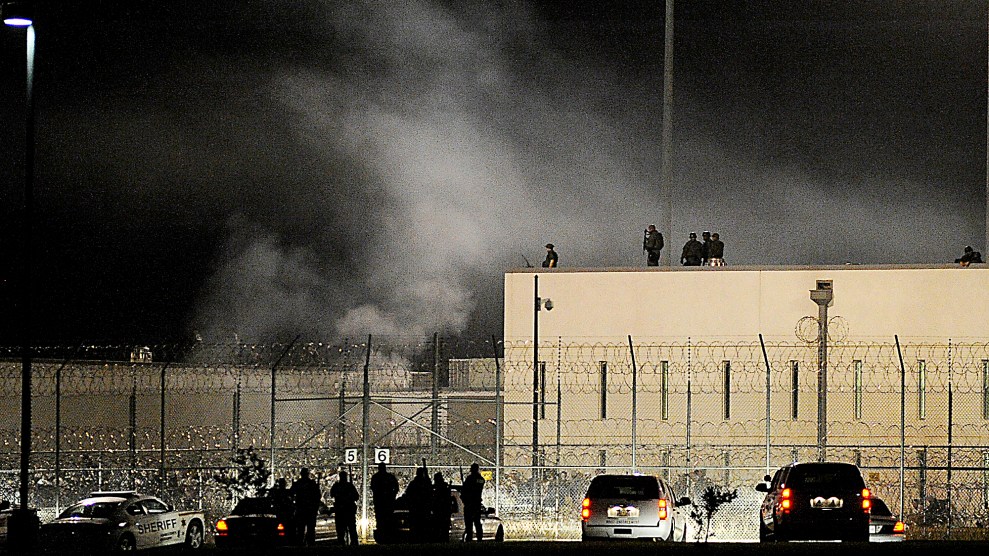
John Moore/Getty
Forget about President Donald Trump’s wild dreams of fortifying his border wall with a snake-filled moat: The immigration policies he has implemented have wreaked havoc at the border and expanded a cruel detention system rife with health and safety violations. Rep. Pramila Jayapal (D-Wash.) says this system is in desperate need of reform—and in recent months has pushed to keep the issue a top priority for legislators.
On September 26, the House Subcommittee on Immigration and Citizenship held a hearing on the continued expansion and current state of Immigration and Customs Enforcement’s detention system. Chaired by Jayapal, the hearing included testimonies from former detainees, advocates, and former ICE Director Thomas Homan. In February, Congress approved funding for ICE for about 45,000 beds per day in the hopes of reducing that number to 40,500 beds by October 1. NBC News reported that in August, the Department of Homeland Security transferred $169 million from other agencies, including FEMA and the Coast Guard, to ICE. Now, there are about 51,000 people in ICE detention. “It is a universally accepted fact that immigration detention is supposed to be a civil, non-punitive function,” Jayapal said in her opening statement, “However, the immigration detention system is a virtual replica of the criminal incarceration system.”
Jayapal has sponsored a House bill, the Dignity for Detained Immigrants Act, that would completely overhaul that system, including eliminating for-profit immigration detention. Though Jayapal’s bill would be ignored by a Republican-led Senate, it’s reflective of how progressive Democrats think about fixing an unjust punitive system.
In the wake of last week’s hearing, Jayapal spoke with Mother Jones about the bill and how she thinks the immigration process could be transformed. The conversation has been edited for length and clarity.
Give a quick summary of what your bill would do.
The Dignity for Detained Immigrants Act would transform the detention system from its currently cruel and inhumane and costly system to one that is much more humane and cost-effective. It would transition all for-profit immigration prisons to government-run and funded detention centers over a period of three years. It would also eliminate mandatory detention. It would protect the rights of vulnerable populations, in particular, by introducing alternatives to detention for those who do not need to be in a jail, have never been charged, much less convicted of anything, and are simply waiting for their asylum papers to come through. It streamlines the whole detention process so that we are really only retaining people who really need to be in detention and we are not using it as a punitive incarceration system for 56,000 people every day.
What are some of those alternatives to detention?
There are a number of community-based programs that have been incredibly effective where you can release individuals into the community. You can provide them with legal resources and support so that they know what the processes and then they can come back into the system for this hearings. The woman who was testifying today from the Interfaith Community for Detained Immigrants talked about how they have 100 percent rate of people showing up for their hearings when they are in the alternatives to detention program because they get resources along with that, so that they really understand what they need to do and when they need to show up. So most of the programs are based in the community. They’re run by community-based nonprofits, and they are done in conjunction with government officials so that people are released, and then they come back to be processed through the system.
As far as detention centers, how should those be operating?
Right now, the vast majority of immigration jails—we call it detention because it sounds better but they’re actually immigration jails—are largely operated by for-profit prison companies, and that is CoreCivic and the GEO Group. They make hundreds of millions of dollars on detaining people who have committed no crime. We are actually using some county jails now to hold people as well. But the private prison contractors have very little incentive to lower their prices or to provide some of the basic standards that should be met within detention centers, which is why we have so many inspector general reports and other accounts, data around how badly the detention centers operate and some of the horrendous things like nooses, hanging, dirty moldy food, no medical care. These have all been documented by the [Homeland Security] inspector general, including by the inspector general’s office that has been serving under Trump. If we could eliminate a huge number of the people being held in detention, then the much, much smaller number of people in detention could be held in government facilities.
The bill also sets up a penalty system for facilities that are noncompliant with a certain set of standards. Why is it important to have these types of accountability measures?
Because even though we do have some standards, they are applied extremely inconsistently. Even when the attorney general says there are problems and writes a report, and says that a facility is not meeting the standards, nothing is done. That facility continues to get money; that facility continues to operate. And there’s really no enforcement of the requirements that we have. We also do need to strengthen those standards, and make sure that they’re being adhered to. I think all of that means that we’ve got to have accountability and enforcement. Those penalties are a way to say you don’t get to continue to operate if you don’t meet the standards and if you don’t meet the requirements that we’ve set out for detention center to operate.
ICE has rapidly expanded its detention network in the Deep South this year even though Congress directed it to detain fewer people. What do you want the House to do to prevent that from happening again?
Well, we should pass my Dignity for Detained Immigrants Act so that we transform the detention centers. We should end some of the programs that the administration started that have led to the surges and spikes in detention. We should institute alternatives to detention, including down at the border. But we have to end Remain in Mexico and the asylum ban and some of these other things that have caused, in part, the buildup of people along the southern border and therefore into our detention centers.
One of the things that’s also happening is this overload in immigration courts around the country and this backlog of cases. Do you have a plan for how to tackle that?
The reality is that most of the people that are being processed at the border through Trump’s cruel Remain in Mexico policy are essentially bumping everybody else that is in the immigration court. So as we’ve criminalized immigration and we’ve put more people who really should not be in that system in front of a judge, and we’ve taken away the prosecutorial discretion, what it’s meant is this giant backlog in the immigration courts, and no due process. People are essentially being tried in groups. I just came back from a court in Texas, in El Paso, observing what had happened. Five courts there have been taken over by Remain in Mexico individuals who now have to be processed. And because they don’t have attorneys, they are clogging up the courts. They don’t need to be processed in that way. They don’t need to be held and criminally prosecuted for seeking asylum. We should be processing them separately. There’s been a problem with backlogs of cases because we keep adding to the list of people that now are going through immigration proceedings in front of a judge. That doesn’t need to be the case.
What can be done to create legal pathways so that people don’t migrate through these unauthorized routes?
We’ve been working on comprehensive immigration reform for almost 20 years now. It’s just a travesty that we use the work and the labor and the services and the contributions of immigrants, but we don’t allow a way for our system to function effectively. So, you know, we need to legalize the 11 million undocumented immigrants who are living here in the country, many of them have been here for more than a decade. So first, we need to take care of that. And then we need to also ensure that the 4 million people or so that have been waiting in line to reunite with their families that they are processed. Once we’ve done that, then we can start and say, “Okay, what’s the system we want to have?” What we want to make sure we do is that we have a flow of workers in the industries that need workers, many of which are industries that are populated by women like home healthcare, but they don’t get prioritized the same way that industries populated by men do. So we need to make sure that we are dealing with the needs of the economy, that we have a future flow workers, that respects workers of all classes and recognizes the value of all workers. We need to make sure that we continue to have a robust family immigration system.
If we do all of that, then we would not have the enforcement problems we have. We could have sane, humane, and reasonable enforcement along our borders and in the interior with the ability to penalize employers who continue to break the law. But we’ve got to change the rules so that workers can work and can have benefits and rights on the job, even if they come here for a short period of time as workers. So the pillars are pretty clear. In addition to that, we have got to deal with the root causes of migration. And that is making sure that we’re investing in the development of countries that send a lot of immigrants, but also making sure that we have particular ways for regions like the Northern Triangle region right now that is experiencing tremendous violence to be able to process and send people to the United States, so that there is a place of refuge for people to come to. We have to continue to be that country that welcomes people from all over the world.
Do you think House Democrats are going to be willing to spend the political capital to make all this happen?
It is certainly something that I am deeply committed to. I know the Progressive Caucus, and the Hispanic Caucus, we have many members who feel we absolutely cannot give this administration a dollar more for this kind of enforcement. They’re already stealing it from other places, like our troops, just to build a vanity wall that hasn’t even been authorized by Congress. But they’re also spending over the amount that Congress authorized for detention right now. Every year they do this, we only authorize a certain amount, and then they end up spending more because they’re detaining more. They need to set a clear set of priorities. Whether or not we’re able to hold on to that is complicated because we have a Democratic House, a Republican Senate, and a cruel, cruel, lawless, Republican president, which makes it very difficult. We have 133 co-sponsors on my bill, and many of my colleagues understand the dire circumstances that immigrants in this country face today.
Of the current presidential candidates, whose immigration policies have you been impressed with?
Julián Castro has done a great job of kind of talking about some of the travesties of immigration. All of the progressive candidates—Sen. Warren and Sen. Sanders have both talked about the ways in which we need to transform our system and pass comprehensive reform. Sen. Harris and I have introduced a number of bills together, including around access to legal counsel. Sen. Booker actually has cosponsored my Dignity for Detained Immigrants bill in the Senate. We have a number of champions on this issue. It’s starting to take more and more prominence and people are starting to understand in spite of the language, the rhetoric that is so divisive and that really criminalizes immigrants. In spite of that rhetoric that’s coming from the White House and the administration, the reality is the vast majority of people in the United States understand what our values are. They understand that immigrants contribute to this country, that we wouldn’t be here without immigrants from all over the world.
















